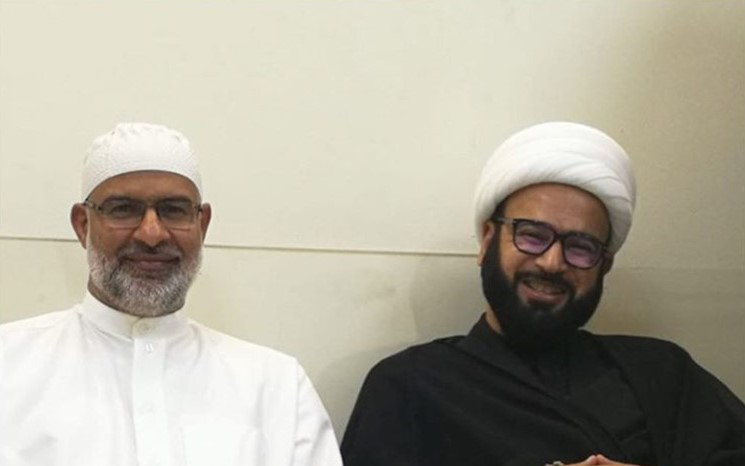**Updated 07 November 2018 – Individuals detained during Ashura, including AbdulMajeed Abdulla Mohsen, have been released except for one. However, clerics continue to be targeted, with two other clerics arrested on 29 October due to their religious discourse around Ashura.
**Updated 26 October 2018 – There are clerics who remain in detention since September. On 19 September, AbdulMajeed Abdulla Mohsen, a prominent pro-democracy activist in Bahrain nicknamed “Haji Samoud/Smood,” was called to the Manama police station but first attended a prayer and funeral as part of an Ashura ceremony. Arriving at the police station, he was arrested on charges of participating in an unauthorized funeral and would be held for 15 days during investigations. He was sentenced on charges of “illegal gathering” and is being held on other additional charges. Six other funeral goers were also arrested and detained. Disruptions of Ashura commemorations have also persisted.
On 12 September, Ahmed Abdulla AlAjaimi was transferred to solitary confinement without reason and beaten by prison authorities five days later. While released from solitary confinement on 19 September, the punishment stemmed from the possession and display of items and inscriptions commemorating Ashura. On 3 October, the detention of 14 Shia individuals was renewed without reason, and five Shia individuals who had participated in Ashura commemorations had been arrested for their religious activities. Authorities in Isa Town Women’s Prison were additionally reported withholding religious materials for the exercise of Ashura religious rites despite prisoners’ requests for books.
In the lead-up to this year’s Ashura – a prominent holy day for Muslims and particularly the Shia Muslim community – Bahraini authorities have continued to interfere in the peaceful commemoration of the event. Although the majority of Bahrain’s citizen population is Shia, the community faces institutionalized discrimination, and the Sunni ruling family routinely suppresses their right to free belief. The Ashura holy day is an annual target of Bahrain’s security forces – which virtually bar Shia from enlisting – and just this month, authorities launched a new campaign of harassment against Shia clerics and religious leaders ahead of the commemoration. Throughout this past week alone, the authorities summoned or detained more than dozen Shia religious figures, further restricting civil society space and the right to religious freedom.
ADHRB has received reports that, starting on 14 September 2018, at least 15 clerics and orators were harassed by the authorities. On 16 September 2018, for example, both Sheikh Hani al-Banna and Sheikh Yassin al-Jamri, two Shia clerics, were arrested and taken in for hours of interrogations. Posts on social media have since indicated that on 18 September, the two clerics were brought before the Public Prosecution Office and remanded into custody for 15 days with no charges or reasoning stated. At least two other clerics are believed to still be detained along with Sheikh al-Banna and Sheikh al-Jamri. Security forces are simultaneously reported to be arbitrarily removing Ashura-related displays, in a pattern documented by ADHRB in past years.
The clampdown ahead of this year’s Ashura is only the latest episode in a long-running trend of judicial harassment targeting Shia religious leaders. Over just several months in 2017, Bahraini authorities interrogated, arrested, or prosecuted upwards of 70 Shia clerics, one of whom was Sheikh Isa Qassim – the most prominent Shia religious leader in the kingdom. At over 70 years old, Sheikh Qasim has faced repeated targeting by the government, with authorities arbitrarily revoking his citizenship in 2016 and confining him under de facto house arrest after convicting him on charges related to Shia religious practices. When hundreds of his supporters launched a peaceful sit-in outside his home in Diraz, security forces violently attacked it, killing six protesters across two major raids.
Other prominent Shia political and religious figures, including opposition leaders Sheikh Ali Salman and Hassan Mushaima, have faced continual government abuse. Sheikh Salman, Secretary-General of Al-Wefaq, was arbitrarily arrested in 2014 and ultimately imprisoned for giving political speeches. Last year the authorities brought baseless new charges of espionage against him related to the ongoing Qatar crisis, and – while he was acquitted – the Public Prosecution has appealed the verdict and continues to seek the death sentence. Meanwhile, authorities consistently subject Mushaima, leader of the Haq opposition movement, to inhumane treatment in prison, denying him access to crucial medical treatment and confiscating his personal and religious texts.
Sheikh Abduljalil al-Miqdad, Sheikh Mohammed al-Miqdad, Sheikh Saeed al-Noori, Sheikh Hussein Najati, and countless other clerics have faced similar treatment. Sheikh Hussein Najati was arbitrarily denaturalized and forcibly deportation by the government in 2014, while Sheikh Mohammed al-Miqdad directly implicated King Hamad’s son, Sheikh Nasser, in allegations of torture.
Despite clear discrimination and harassment of Bahrain’s Shia population, the government continues to push an image of tolerance in international forums. In the July 2018 United States Department of State Ministerial to Advance Religious Freedom, it announced a new Ambassador-at-Large for Peaceful Coexistence and Religious Freedom. Bahrain’s announcement underscored a false narrative launched in 2017 with King Hamad’s Bahrain Declaration on Religious Tolerance and the creation of the King Hamad Centre for Peaceful Coexistence. Meanwhile, the government has been targeting Ashura commemorations since before 2011, limiting access to processions and interrogating clerics for their sermons amid a decades-long history of sectarian discrimination.
The government’s continued violations of religious rights demonstrate that its international promotion of tolerance is disingenuous. While some detained clerics have been released before this year’s Ashura, others remain in custody alongside Bahrain’s thousands of political prisoners. As the government continues to target Ashura activities and the Shia community’s religious figures, it is clear that religious discrimination remains entrenched in Bahrain’s institutions. Until all arbitrary detained clerics are released, Ashura activities for the Shia community protected, and structural discrimination eliminated, Bahrain must focus on combating prejudice and promoting tolerance at home.
Laura Neumayer is an Advocacy Fellow with ADHRB.





